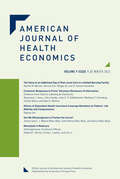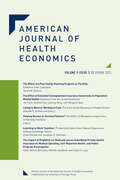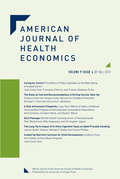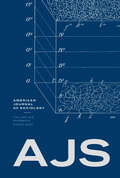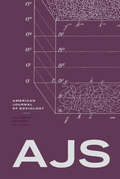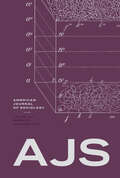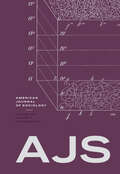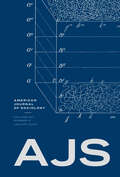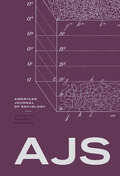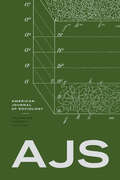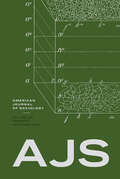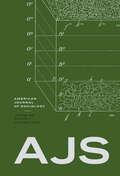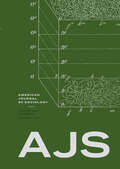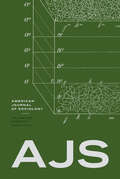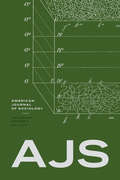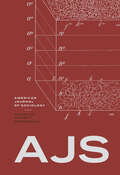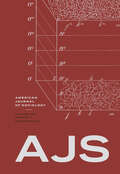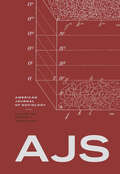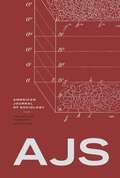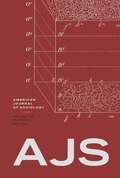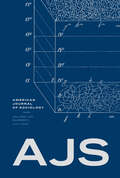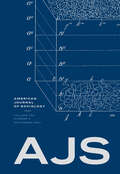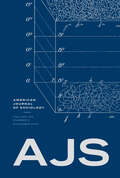- Table View
- List View
American Journal of Health Economics, volume 9 number 1 (Winter 2023)
by American Journal of Health EconomicsThis is volume 9 issue 1 of American Journal of Health Economics. The American Journal of Health Economics (AJHE) provides a forum for the in-depth analysis of health care markets and individual health behaviors. The articles appearing in AJHE are authored by scholars from universities, private research organizations, government, and industry. Subjects of interest include competition among private insurers, hospitals, and physicians; impacts of public insurance programs; pharmaceutical innovation and regulation; medical device supply; the rise of obesity and its consequences; the influence and growth of aging populations; and much more. The journal is published for the American Society of Health Economists (ASHEcon), which is a professional, non-profit organization dedicated to promoting excellence in health economics research in the United States.
American Journal of Health Economics, volume 9 number 2 (Spring 2023)
by American Journal of Health EconomicsThis is volume 9 issue 2 of American Journal of Health Economics. The American Journal of Health Economics (AJHE) provides a forum for the in-depth analysis of health care markets and individual health behaviors. The articles appearing in AJHE are authored by scholars from universities, private research organizations, government, and industry. Subjects of interest include competition among private insurers, hospitals, and physicians; impacts of public insurance programs; pharmaceutical innovation and regulation; medical device supply; the rise of obesity and its consequences; the influence and growth of aging populations; and much more. The journal is published for the American Society of Health Economists (ASHEcon), which is a professional, non-profit organization dedicated to promoting excellence in health economics research in the United States.
American Journal of Health Economics, volume 9 number 3 (Summer 2023)
by American Journal of Health EconomicsThis is volume 9 issue 3 of American Journal of Health Economics. The American Journal of Health Economics (AJHE) provides a forum for the in-depth analysis of health care markets and individual health behaviors. The articles appearing in AJHE are authored by scholars from universities, private research organizations, government, and industry. Subjects of interest include competition among private insurers, hospitals, and physicians; impacts of public insurance programs; pharmaceutical innovation and regulation; medical device supply; the rise of obesity and its consequences; the influence and growth of aging populations; and much more. The journal is published for the American Society of Health Economists (ASHEcon), which is a professional, non-profit organization dedicated to promoting excellence in health economics research in the United States.
American Journal of Health Economics, volume 9 number 4 (Fall 2023)
by American Journal of Health EconomicsThis is volume 9 issue 4 of American Journal of Health Economics. The American Journal of Health Economics (AJHE) provides a forum for the in-depth analysis of health care markets and individual health behaviors. The articles appearing in AJHE are authored by scholars from universities, private research organizations, government, and industry. Subjects of interest include competition among private insurers, hospitals, and physicians; impacts of public insurance programs; pharmaceutical innovation and regulation; medical device supply; the rise of obesity and its consequences; the influence and growth of aging populations; and much more. The journal is published for the American Society of Health Economists (ASHEcon), which is a professional, non-profit organization dedicated to promoting excellence in health economics research in the United States.
American Journal of Sociology, volume 126 number 5 (March 2021)
by American Journal of SociologyThis is volume 126 issue 5 of American Journal of Sociology. American Journal of Sociology (AJS) presents pathbreaking work from all areas of sociology, with an emphasis on theory building and innovative methods. AJS strives to speak to the general sociology reader and is open to contributions from across the social sciences—sociology, political science, economics, history, anthropology, and statistics—that seriously engage the sociological literature to forge new ways of understanding the social. AJS offers a substantial book review section that identifies the most salient work of both emerging and enduring scholars of social science. Commissioned review essays appear occasionally, offering readers a comparative, in-depth examination of prominent titles.
American Journal of Sociology, volume 127 number 1 (July 2021)
by American Journal of SociologyThis is volume 127 issue 1 of American Journal of Sociology. American Journal of Sociology (AJS) presents pathbreaking work from all areas of sociology, with an emphasis on theory building and innovative methods. AJS strives to speak to the general sociology reader and is open to contributions from across the social sciences—sociology, political science, economics, history, anthropology, and statistics—that seriously engage the sociological literature to forge new ways of understanding the social. AJS offers a substantial book review section that identifies the most salient work of both emerging and enduring scholars of social science. Commissioned review essays appear occasionally, offering readers a comparative, in-depth examination of prominent titles.
American Journal of Sociology, volume 127 number 2 (September 2021)
by American Journal of SociologyThis is volume 127 issue 2 of American Journal of Sociology. American Journal of Sociology (AJS) presents pathbreaking work from all areas of sociology, with an emphasis on theory building and innovative methods. AJS strives to speak to the general sociology reader and is open to contributions from across the social sciences—sociology, political science, economics, history, anthropology, and statistics—that seriously engage the sociological literature to forge new ways of understanding the social. AJS offers a substantial book review section that identifies the most salient work of both emerging and enduring scholars of social science. Commissioned review essays appear occasionally, offering readers a comparative, in-depth examination of prominent titles.
American Journal of Sociology, volume 127 number 3 (November 2021)
by American Journal of SociologyThis is volume 127 issue 3 of American Journal of Sociology. American Journal of Sociology (AJS) presents pathbreaking work from all areas of sociology, with an emphasis on theory building and innovative methods. AJS strives to speak to the general sociology reader and is open to contributions from across the social sciences—sociology, political science, economics, history, anthropology, and statistics—that seriously engage the sociological literature to forge new ways of understanding the social. AJS offers a substantial book review section that identifies the most salient work of both emerging and enduring scholars of social science. Commissioned review essays appear occasionally, offering readers a comparative, in-depth examination of prominent titles.
American Journal of Sociology, volume 127 number 4 (January 2022)
by American Journal of SociologyThis is volume 127 issue 4 of American Journal of Sociology. American Journal of Sociology (AJS) presents pathbreaking work from all areas of sociology, with an emphasis on theory building and innovative methods. AJS strives to speak to the general sociology reader and is open to contributions from across the social sciences—sociology, political science, economics, history, anthropology, and statistics—that seriously engage the sociological literature to forge new ways of understanding the social. AJS offers a substantial book review section that identifies the most salient work of both emerging and enduring scholars of social science. Commissioned review essays appear occasionally, offering readers a comparative, in-depth examination of prominent titles.
American Journal of Sociology, volume 127 number 5 (March 2022)
by American Journal of SociologyThis is volume 127 issue 5 of American Journal of Sociology. American Journal of Sociology (AJS) presents pathbreaking work from all areas of sociology, with an emphasis on theory building and innovative methods. AJS strives to speak to the general sociology reader and is open to contributions from across the social sciences—sociology, political science, economics, history, anthropology, and statistics—that seriously engage the sociological literature to forge new ways of understanding the social. AJS offers a substantial book review section that identifies the most salient work of both emerging and enduring scholars of social science. Commissioned review essays appear occasionally, offering readers a comparative, in-depth examination of prominent titles.
American Journal of Sociology, volume 128 number 1 (July 2022)
by American Journal of SociologyThis is volume 128 issue 1 of American Journal of Sociology. American Journal of Sociology (AJS) presents pathbreaking work from all areas of sociology, with an emphasis on theory building and innovative methods. AJS strives to speak to the general sociology reader and is open to contributions from across the social sciences—sociology, political science, economics, history, anthropology, and statistics—that seriously engage the sociological literature to forge new ways of understanding the social. AJS offers a substantial book review section that identifies the most salient work of both emerging and enduring scholars of social science. Commissioned review essays appear occasionally, offering readers a comparative, in-depth examination of prominent titles.
American Journal of Sociology, volume 128 number 2 (September 2022)
by American Journal of SociologyThis is volume 128 issue 2 of American Journal of Sociology. American Journal of Sociology (AJS) presents pathbreaking work from all areas of sociology, with an emphasis on theory building and innovative methods. AJS strives to speak to the general sociology reader and is open to contributions from across the social sciences—sociology, political science, economics, history, anthropology, and statistics—that seriously engage the sociological literature to forge new ways of understanding the social. AJS offers a substantial book review section that identifies the most salient work of both emerging and enduring scholars of social science. Commissioned review essays appear occasionally, offering readers a comparative, in-depth examination of prominent titles.
American Journal of Sociology, volume 128 number 3 (November 2022)
by American Journal of SociologyThis is volume 128 issue 3 of American Journal of Sociology. American Journal of Sociology (AJS) presents pathbreaking work from all areas of sociology, with an emphasis on theory building and innovative methods. AJS strives to speak to the general sociology reader and is open to contributions from across the social sciences—sociology, political science, economics, history, anthropology, and statistics—that seriously engage the sociological literature to forge new ways of understanding the social. AJS offers a substantial book review section that identifies the most salient work of both emerging and enduring scholars of social science. Commissioned review essays appear occasionally, offering readers a comparative, in-depth examination of prominent titles.
American Journal of Sociology, volume 128 number 4 (January 2023)
by American Journal of SociologyThis is volume 128 issue 4 of American Journal of Sociology. American Journal of Sociology (AJS) presents pathbreaking work from all areas of sociology, with an emphasis on theory building and innovative methods. AJS strives to speak to the general sociology reader and is open to contributions from across the social sciences—sociology, political science, economics, history, anthropology, and statistics—that seriously engage the sociological literature to forge new ways of understanding the social. AJS offers a substantial book review section that identifies the most salient work of both emerging and enduring scholars of social science. Commissioned review essays appear occasionally, offering readers a comparative, in-depth examination of prominent titles.
American Journal of Sociology, volume 128 number 5 (March 2023)
by American Journal of SociologyThis is volume 128 issue 5 of American Journal of Sociology. American Journal of Sociology (AJS) presents pathbreaking work from all areas of sociology, with an emphasis on theory building and innovative methods. AJS strives to speak to the general sociology reader and is open to contributions from across the social sciences—sociology, political science, economics, history, anthropology, and statistics—that seriously engage the sociological literature to forge new ways of understanding the social. AJS offers a substantial book review section that identifies the most salient work of both emerging and enduring scholars of social science. Commissioned review essays appear occasionally, offering readers a comparative, in-depth examination of prominent titles.
American Journal of Sociology, volume 128 number 6 (May 2023)
by American Journal of SociologyThis is volume 128 issue 6 of American Journal of Sociology. American Journal of Sociology (AJS) presents pathbreaking work from all areas of sociology, with an emphasis on theory building and innovative methods. AJS strives to speak to the general sociology reader and is open to contributions from across the social sciences—sociology, political science, economics, history, anthropology, and statistics—that seriously engage the sociological literature to forge new ways of understanding the social. AJS offers a substantial book review section that identifies the most salient work of both emerging and enduring scholars of social science. Commissioned review essays appear occasionally, offering readers a comparative, in-depth examination of prominent titles.
American Journal of Sociology, volume 129 number 1 (July 2023)
by American Journal of SociologyThis is volume 129 issue 1 of American Journal of Sociology. American Journal of Sociology (AJS) presents pathbreaking work from all areas of sociology, with an emphasis on theory building and innovative methods. AJS strives to speak to the general sociology reader and is open to contributions from across the social sciences—sociology, political science, economics, history, anthropology, and statistics—that seriously engage the sociological literature to forge new ways of understanding the social. AJS offers a substantial book review section that identifies the most salient work of both emerging and enduring scholars of social science. Commissioned review essays appear occasionally, offering readers a comparative, in-depth examination of prominent titles.
American Journal of Sociology, volume 129 number 2 (September 2023)
by American Journal of SociologyThis is volume 129 issue 2 of American Journal of Sociology. American Journal of Sociology (AJS) presents pathbreaking work from all areas of sociology, with an emphasis on theory building and innovative methods. AJS strives to speak to the general sociology reader and is open to contributions from across the social sciences—sociology, political science, economics, history, anthropology, and statistics—that seriously engage the sociological literature to forge new ways of understanding the social. AJS offers a substantial book review section that identifies the most salient work of both emerging and enduring scholars of social science. Commissioned review essays appear occasionally, offering readers a comparative, in-depth examination of prominent titles.
American Journal of Sociology, volume 129 number 3 (November 2023)
by American Journal of SociologyThis is volume 129 issue 3 of American Journal of Sociology. American Journal of Sociology (AJS) presents pathbreaking work from all areas of sociology, with an emphasis on theory building and innovative methods. AJS strives to speak to the general sociology reader and is open to contributions from across the social sciences—sociology, political science, economics, history, anthropology, and statistics—that seriously engage the sociological literature to forge new ways of understanding the social. AJS offers a substantial book review section that identifies the most salient work of both emerging and enduring scholars of social science. Commissioned review essays appear occasionally, offering readers a comparative, in-depth examination of prominent titles.
American Journal of Sociology, volume 129 number 4 (January 2024)
by American Journal of SociologyThis is volume 129 issue 4 of American Journal of Sociology. American Journal of Sociology (AJS) presents pathbreaking work from all areas of sociology, with an emphasis on theory building and innovative methods. AJS strives to speak to the general sociology reader and is open to contributions from across the social sciences—sociology, political science, economics, history, anthropology, and statistics—that seriously engage the sociological literature to forge new ways of understanding the social. AJS offers a substantial book review section that identifies the most salient work of both emerging and enduring scholars of social science. Commissioned review essays appear occasionally, offering readers a comparative, in-depth examination of prominent titles.
American Journal of Sociology, volume 129 number 5 (March 2024)
by American Journal of SociologyThis is volume 129 issue 5 of American Journal of Sociology. American Journal of Sociology (AJS) presents pathbreaking work from all areas of sociology, with an emphasis on theory building and innovative methods. AJS strives to speak to the general sociology reader and is open to contributions from across the social sciences—sociology, political science, economics, history, anthropology, and statistics—that seriously engage the sociological literature to forge new ways of understanding the social. AJS offers a substantial book review section that identifies the most salient work of both emerging and enduring scholars of social science. Commissioned review essays appear occasionally, offering readers a comparative, in-depth examination of prominent titles.
American Journal of Sociology, volume 129 number 6 (May 2024)
by American Journal of SociologyThis is volume 129 issue 6 of American Journal of Sociology. American Journal of Sociology (AJS) presents pathbreaking work from all areas of sociology, with an emphasis on theory building and innovative methods. AJS strives to speak to the general sociology reader and is open to contributions from across the social sciences—sociology, political science, economics, history, anthropology, and statistics—that seriously engage the sociological literature to forge new ways of understanding the social. AJS offers a substantial book review section that identifies the most salient work of both emerging and enduring scholars of social science. Commissioned review essays appear occasionally, offering readers a comparative, in-depth examination of prominent titles.
American Journal of Sociology, volume 130 number 1 (July 2024)
by American Journal of SociologyThis is volume 130 issue 1 of American Journal of Sociology. American Journal of Sociology (AJS) presents pathbreaking work from all areas of sociology, with an emphasis on theory building and innovative methods. AJS strives to speak to the general sociology reader and is open to contributions from across the social sciences—sociology, political science, economics, history, anthropology, and statistics—that seriously engage the sociological literature to forge new ways of understanding the social. AJS offers a substantial book review section that identifies the most salient work of both emerging and enduring scholars of social science. Commissioned review essays appear occasionally, offering readers a comparative, in-depth examination of prominent titles.
American Journal of Sociology, volume 130 number 2 (September 2024)
by American Journal of SociologyThis is volume 130 issue 2 of American Journal of Sociology. American Journal of Sociology (AJS) presents pathbreaking work from all areas of sociology, with an emphasis on theory building and innovative methods. AJS strives to speak to the general sociology reader and is open to contributions from across the social sciences—sociology, political science, economics, history, anthropology, and statistics—that seriously engage the sociological literature to forge new ways of understanding the social. AJS offers a substantial book review section that identifies the most salient work of both emerging and enduring scholars of social science. Commissioned review essays appear occasionally, offering readers a comparative, in-depth examination of prominent titles.
American Journal of Sociology, volume 130 number 3 (November 2024)
by American Journal of SociologyThis is volume 130 issue 3 of American Journal of Sociology. American Journal of Sociology (AJS) presents pathbreaking work from all areas of sociology, with an emphasis on theory building and innovative methods. AJS strives to speak to the general sociology reader and is open to contributions from across the social sciences—sociology, political science, economics, history, anthropology, and statistics—that seriously engage the sociological literature to forge new ways of understanding the social. AJS offers a substantial book review section that identifies the most salient work of both emerging and enduring scholars of social science. Commissioned review essays appear occasionally, offering readers a comparative, in-depth examination of prominent titles.
